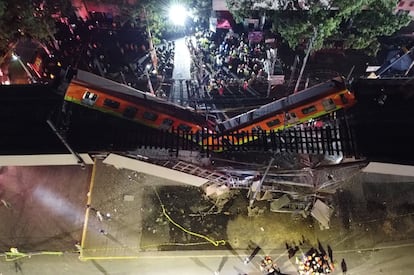Carlos Slim’s company pays out thousands of dollars to Mexico City metro tragedy victims to prevent further lawsuits
The compensation agreement, to which EL PAÍS has had access, covers all damage suffered as a result of the accident on Line 12, which left 26 people dead


Grupo Carso, the conglomerate owned by Mexican billionaire Carlos Slim, agreed to pay thousands of dollars to compensate some of the victims of the metro accident in Mexico City on May 3, 2021, which saw a raised section of Line 12 collapse, leaving 26 people dead and hundreds more injured. That’s according to the compensation agreements, to which EL PAÍS has had access, and which were signed by the victims and Carso Infrastructure and Construction (CICSA), the construction branch of Grupo Carso that built the part of the metro network that collapsed. The money was offered in compensation for all damage suffered as a result of the accident, and in exchange, no further lawsuit or legal claim can be made against the company in the future.
“The parties recognize that the consequence of the approval and fulfillment of the present compensation agreement will be the termination of criminal action against CICSA, its affiliates, stockholders, directors, representatives and employees, with respect to any impact, consequence or damage suffered by the victim, directly or indirectly, as a result of the incident,” read one of the documents, signed in January this year. In this specific case, the amount of money agreed to in the compensation deal was 450,000 pesos, around $21,600 at the current exchange rate. The cheque was issued by Banco Inbursa, which is also owned by Slim.
The agreement, which has six clauses, established that the sum of money completely covers all reparations for damages. This includes non-material and physical damage, psychological assistance, legal advice and psychological, therapeutic and funeral expenses, in accordance with each case. It also compensated for so-called “loss of profit” – all the income the victim has stopped receiving as a result of an injury or death caused by the collapse of Line 12. “The amount in this proceeding is delivered to cover the total and integral sum of the reparation for damages to the victim,” the document stated.
The document also maintained that CISCA’s involvement in the compensation agreement “does not imply, nor must be interpreted, considered or taken into account, as a recognition of any responsibility.” What’s more, the construction branch of Grupo Carso – which won a contract worth 18.5 billion pesos ($900 million) to build a 235-kilometer-long stretch of the Tren Maya (Maya Train), one of the flagship projects of the government of Mexican President Andrés Manuel López Obrador – stated that its expert reports do not support the findings made by the Mexico City Public Prosecution of Justice (FGJCDMX).
“Notwithstanding the foregoing [the discrepancies between the reports], CICSA is strongly committed to supporting the effort that FGJCDMX and the Executive Committee of the Mexico City Victims Assistance [CEAVI] have been making in tandem to comprehensively remedy the damage suffered by the victims,” stated the compensation agreement. Last October, Grupo Carso announced in a press release that it would assume all the costs of rebuilding and restoring Line 12 of the metro network, which serves Mexico City residents in the southeastern end of the capital.
The compensation agreement must be interpreted as a recognition of any responsibilityCompensation deal
In the compensation agreement to rebuild Line 12, which was signed with the Mexican government and the Metro Collective Transportation System, CICSA also denied responsibility for the collapse, stating: “CICSA did not cause nor is responsible for the terrible event of last May 3 on Line 12 of the metro.” The announcement came four months after Slim, López Obrador and Claudia Sheinbaum, the head of the Mexico City government, held a meeting on the tragedy at Mexico’s National Palace.
The latest compensation agreements, which have not been made public, came about through the mediation of the public prosecution and CEAVI, which is advising most of the victims of the metro collapse and their families. “Currently, we have signed compensation agreements with 80% of the direct and indirect victims, strictly complying with international standards, including loss of income,” said public prosecutor Ernestina Godoy, in her second report on the work on January 19. Godoy said the agreement prioritized the victims and guaranteed health, education and safety measures for the children who were orphaned by the collapse.
But lawyers representing other victims – who have not signed agreements – questioned how this move will affect Grupo Carso’s legal responsibility. When asked by EL PAÍS, Godoy did not clarify whether she was explicitly stating that 80% of the victims had reached an agreement with CICSA, nor what implication this could have on the case.
A few days after Godoy’s announcement, it was revealed that eight in 10 victims had signed compensation deals. Lawyers representing the victims who are not being advised by CEAVI argued there was pressure to “shelve” the case and complained that the money being offered was not enough. Sheinbaum denied this. “There is no pressure,” she said. “I think it is very good that, as well as the support that has been given by the Victims Commission and metro insurance, the public prosecution is achieving this additional support.” One of the clauses of the agreement explicitly states that the document must be signed voluntarily.
A source close to the negotiations says that CICSA offered between 400,000 and six million pesos (between $19,480 and $292,212) and for each one of the victims, depending on the degree to which they were affected by the accident. When asked about this, Grupo Carso did not confirm or deny that it offered this amount of money. A spokesperson from the global conglomerate responded that they were going to discuss the information published by this newspaper, but that the response time EL PAÍS had given was too short. The spokesperson said the company will assess whether to make a statement or not in the following days. The head of CEAVI, Armando Ocampo, was also contacted, but has not yet replied.
In the agreement, CICSA also reserved the right to take legal action against third parties that are deemed responsible for the collapse, and to demand that they cover the compensation to the victims. In December, the public prosecution charged 10 former public officials for the crimes of bodily injury, property damage and culpable homicide in the Mexico City metro tragedy. The official investigation concluded that the collapse was due to faults in the design and construction of the structure, as well as the poor quality of the materials used. So far, however, Grupo Carso and other companies involved with the construction have not been formally accused in the case.
Tu suscripción se está usando en otro dispositivo
¿Quieres añadir otro usuario a tu suscripción?
Si continúas leyendo en este dispositivo, no se podrá leer en el otro.
FlechaTu suscripción se está usando en otro dispositivo y solo puedes acceder a EL PAÍS desde un dispositivo a la vez.
Si quieres compartir tu cuenta, cambia tu suscripción a la modalidad Premium, así podrás añadir otro usuario. Cada uno accederá con su propia cuenta de email, lo que os permitirá personalizar vuestra experiencia en EL PAÍS.
¿Tienes una suscripción de empresa? Accede aquí para contratar más cuentas.
En el caso de no saber quién está usando tu cuenta, te recomendamos cambiar tu contraseña aquí.
Si decides continuar compartiendo tu cuenta, este mensaje se mostrará en tu dispositivo y en el de la otra persona que está usando tu cuenta de forma indefinida, afectando a tu experiencia de lectura. Puedes consultar aquí los términos y condiciones de la suscripción digital.








































